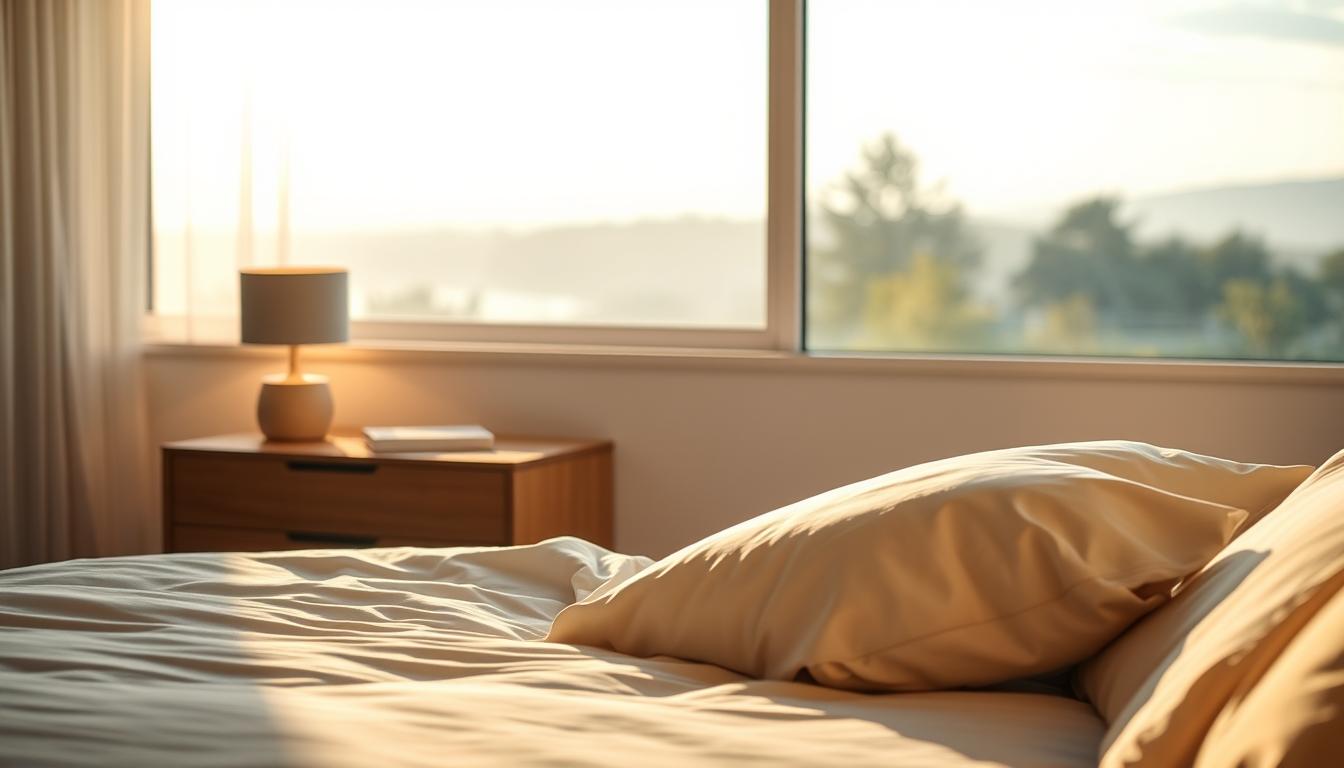I am a participant in the Amazon Services LLC Associates Program, an affiliate advertising program designed to provide a means for sites to earn advertising fees by advertising and linking to Amazon.com and affiliated sites. This post contains affiliate links. Privacy Policy
Improve Sleep Quality: Effective Techniques
Do you often find yourself lying awake at night? Struggling to fall or stay asleep? You’re not alone. Millions of people worldwide deal with sleep-related issues every day. These issues can harm their health and happiness.

Poor sleep habits can cause many problems. You might feel tired, less productive, or even face a higher risk of serious diseases. But, there are ways to improve your sleep quality. By changing your better sleep habits and following sleep hygiene tips, you can wake up feeling great.
Best brain supplement!
Key Takeaways
- Establish a consistent sleep schedule to regulate your body’s internal clock.
- Create a sleep-conducive environment to promote relaxation.
- Avoid stimulating activities before bedtime to ensure a restful night’s sleep.
- Practice relaxation techniques, such as deep breathing or meditation, to calm your mind.
- Limit exposure to screens and electronic devices before bedtime.
Understanding Sleep Quality and Its Impact on Health
It’s key to understand sleep quality for good health. Sleep quality means being able to fall and stay asleep, and getting restful sleep. Better sleep improves your life and how well you function every day.
The Science of Sleep Cycles and Stages
Sleep is not just one state but a mix of stages and cycles. A full sleep cycle lasts 90-120 minutes. It includes light sleep, deep sleep, and REM sleep.
Deep sleep is key for physical repair. REM sleep helps with memory and learning. Knowing about these cycles helps you sleep better.
How Poor Sleep Affects Physical and Mental Wellbeing
Poor sleep harms your body and mind. It can make you less sharp, upset your mood, and raise disease risks. It also hurts your physical skills, like balance.
By using tips for better sleep, you can avoid these problems. This improves your health a lot.
Also, not sleeping well can lead to depression and anxiety. So, better sleep is not just for rest. It’s for keeping you healthy and happy.
Common Causes of Poor Sleep Quality
Finding out why you have trouble sleeping is the first step to better sleep. Many things can make sleep poor, from where you sleep to your habits and health.
Environmental Factors Disrupting Sleep
Your sleep space is key to a good night’s rest. Things like noise, light, and temperature can mess with your sleep. A room that’s too hot or cold can keep you awake.
“A dark, quiet, and cool environment is ideal for sleep,” experts say. Making your bedroom sleep-friendly is a simple way to sleep better.
Lifestyle Habits That Reduce Sleep Quality
What you do during the day affects your sleep. Drinking caffeine and eating heavy meals before bed can hurt your sleep. Also, screens before bed can stop your body from making melatonin.
Having a calm bedtime routine tells your body it’s time to sleep. Avoiding exciting activities before bed is part of good sleep habits.
Medical Conditions and Sleep Disorders
Some health issues and sleep problems can mess with your sleep. Problems like insomnia, sleep apnea, and restless leg syndrome can keep you awake. If you think a health issue is causing your sleep problems, see a doctor.
Fixing health issues can greatly improve your sleep. It’s a big step towards better sleep.
Creating the Optimal Sleep Environment
To improve your sleep, focus on your surroundings. Your bedroom should be a place for rest and recovery. By making your sleep space better, you can sleep better.
Temperature, Humidity, and Ventilation
The right bedroom temperature is key for good sleep. Aim for 60°F to 67°F (15.5°C to 19.4°C). Keep humidity between 30% and 50% to avoid dryness.
Good air flow is also important. It helps remove stale air and brings in fresh air. This makes for a better sleep environment.
- Keep your bedroom cool, around 65°F (18.3°C), for optimal sleep.
- Use a humidifier or dehumidifier to maintain a comfortable humidity level.
- Ensure good airflow by opening windows or using a fan.
Light and Noise Management Strategies
Light and noise are crucial for a good sleep space. Darkness helps your body’s natural clock, while too much noise can mess with your sleep.
- Use blackout curtains or shades to block out light.
- Invest in earplugs or a white noise machine to minimize noise disturbances.
- Consider using a sleep mask if light is still an issue.
Selecting the Right Mattress, Pillows, and Bedding
The right mattress, pillows, and bedding are important for sleep. A good mattress supports your body. Pillows help keep your neck aligned.
- Choose a mattress that suits your preferred firmness and support level.
- Select pillows that maintain the alignment of your neck and spine.
- Opt for breathable bedding to regulate body temperature.
By using these tips, you can make your sleep space better. This can help you relax and sleep better. It’s all about creating a space for rest and well-being.
How to Improve Sleep Quality Through Daily Habits
Making a few simple changes to your daily routine can greatly improve your sleep. These habits can help you wake up feeling refreshed and full of energy.
Establishing a Consistent Sleep-Wake Schedule
One key sleep improvement strategy is to keep a regular sleep schedule. Going to bed and waking up at the same time every day helps your body’s internal clock. This can make your sleep better and easier to fall into.
To start this habit, pick a bedtime and wake-up time and stick to it. Even on weekends or days off. If needed, slowly adjust your schedule to help your body adjust.
Physical Activity and Sunlight Exposure
Regular physical activity and sunlight are key for better sleep. Exercise during the day helps you sleep better at night. Natural sunlight also helps your body’s clock stay in sync. Try to do at least 30 minutes of moderate exercise daily. Also, spend time outside in the morning or at lunch to get sunlight.
Digital Detox: Managing Screen Time Before Bed
Limiting screen time before bed is also important for better sleep. The blue light from screens can stop your body from making melatonin. This makes it harder to fall asleep. Try to avoid screens for at least an hour before bed. You can also use blue light filtering glasses or apps.
Also, create a bedtime routine without screens. This could be reading a book, taking a warm bath, or relaxing with techniques. This helps your body know it’s time to sleep, leading to better sleep quality.
Nutrition and Dietary Approaches for Better Sleep
The food and drinks you choose can affect your sleep. Eating the right foods can help you sleep better. But, a bad diet can mess with your sleep.
Sleep-Promoting Foods and Nutrients
Some foods can make your sleep better. Foods with tryptophan, like turkey and chicken, help make serotonin and melatonin. These are important for sleep.
Also, complex carbs like whole grain bread and cereals boost serotonin. Almonds, with magnesium, can relax your muscles and help you sleep well.
- Turkey and chicken (tryptophan)
- Whole grain bread and cereals (complex carbohydrates)
- Almonds (magnesium)
Beverages and Foods That Disrupt Sleep
Some foods and drinks can mess with your sleep. Caffeine and nicotine, especially before bed, can make it hard to sleep. Heavy or sugary meals can also cause discomfort and indigestion.
Limit or avoid caffeinated drinks and heavy meals near bedtime. This can help you sleep better.
Strategic Meal Timing for Optimal Sleep
When you eat is as important as what you eat for sleep. Eating a big meal before bed can cause discomfort. It’s best to eat 2-3 hours before bed.
A light snack with sleep-promoting foods can be good if you’re hungry before bed. Making smart food choices and eating at the right times can greatly improve your sleep.
Relaxation Techniques and Sleep Rituals
Relaxation techniques and sleep rituals are key to better sleep. They help you sleep longer and wake up feeling good. These practices calm your mind and body, getting you ready for sleep.
Meditation and Mindfulness Practices
Meditation and mindfulness are great for sleep. They lower stress and anxiety, making it easier to sleep. Regular meditation relaxes the mind and improves sleep patterns.
Start with short meditation or mindfulness exercises before bed. This tells your brain it’s time to sleep, boosting your sleep quality.
Progressive Muscle Relaxation and Guided Imagery
Progressive muscle relaxation and guided imagery also improve sleep. The first method relaxes muscles, while the second creates a peaceful mind state.
Progressive muscle relaxation eases physical tension, helping you sleep better. Guided imagery distracts from stress, enhancing sleep duration.
Breathing Exercises and Aromatherapy for Sleep
Breathing exercises and aromatherapy are also good for sleep. Deep breathing slows your heart and calms your mind. Certain scents, like lavender, also promote relaxation and better sleep.
Adding breathing exercises and calming essential oils to your bedtime routine helps. It creates a sleep-friendly environment, improving your sleep and well-being.
Conclusion: Implementing Your Personalized Sleep Improvement Plan
Now that you’ve looked into different ways to improve sleep, it’s time to start making changes. To get better sleep, you need to change your daily habits, sleep space, and how you relax.
Using the sleep tips from this article can really help your health. Begin by picking the biggest changes you can make. This could be setting a regular sleep schedule, making your bedroom better, or trying relaxation methods like meditation.
Remember, it might take a while to see better sleep. Stick to your plan and watch how your sleep gets better. With a good sleep plan, you’ll wake up feeling great and ready to go.
FAQ
What are some effective ways to improve sleep quality?
To improve sleep quality, start by setting a regular sleep schedule. Make your bedroom a sleep haven. Avoid exciting activities before bed. Try relaxation methods like meditation or deep breathing.
How can I enhance my sleep hygiene?
Better sleep hygiene means good sleep habits. Keep your bedroom cool, dark, and quiet. Stay away from caffeine and screens at night. Relax with activities like reading or a warm bath before bed.
What role does nutrition play in sleep quality?
Nutrition is key for good sleep. Eat foods that help you sleep, like those with tryptophan. Avoid foods and drinks that can keep you awake, like caffeine and heavy meals at night.
How can I optimize my sleep environment for better sleep?
For better sleep, make your bedroom sleep-friendly. It should be cool, dark, and quiet. Choose a comfy mattress and pillows. Use blackout curtains, earplugs, or a white noise machine if needed.
What relaxation techniques can help improve sleep quality?
Relaxation techniques like meditation and deep breathing can help. They calm your mind and body. This makes it easier to fall and stay asleep, improving sleep quality.
How does physical activity impact sleep quality?
Exercise can improve sleep by reducing stress and promoting relaxation. But, avoid intense workouts close to bedtime. They can keep you awake.
Can managing screen time before bed improve sleep quality?
Yes, cutting down on screen time before bed helps. The blue light from screens can make it hard to sleep. Try to avoid screens for an hour before bed or use blue light filtering glasses or apps.
How can I improve my sleep patterns naturally?
Improve sleep naturally by sticking to a sleep schedule and creating a sleep-friendly environment. Practice relaxation techniques and make dietary changes to help sleep. These habits can improve your sleep without medication.
I am a participant in the Amazon Services LLC Associates Program, an affiliate advertising program designed to provide a means for sites to earn advertising fees by advertising and linking to Amazon.com and affiliated sites. This post contains affiliate links. Privacy Policy


